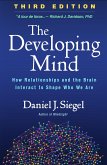Other Minds
How Humans Bridge the Divide Between Self and Others
Herausgeber: Malle, Bertram F; Hodges, Sara D
Other Minds
How Humans Bridge the Divide Between Self and Others
Herausgeber: Malle, Bertram F; Hodges, Sara D
- Broschiertes Buch
- Merkliste
- Auf die Merkliste
- Bewerten Bewerten
- Teilen
- Produkt teilen
- Produkterinnerung
- Produkterinnerung
One of the great challenges of social cognitive science is to understand how we can enter, or "read," the minds of others - that is, infer complex mental states such as beliefs, desires, intentions, and emotions. This book presents theories and empirical findings on this essential topic.
Andere Kunden interessierten sich auch für
![Handbook of Emotion Regulation Handbook of Emotion Regulation]() Handbook of Emotion Regulation113,99 €
Handbook of Emotion Regulation113,99 €![The Developing Mind The Developing Mind]() Daniel J. SiegelThe Developing Mind86,99 €
Daniel J. SiegelThe Developing Mind86,99 €![Handbook of Competence and Motivation Handbook of Competence and Motivation]() Handbook of Competence and Motivation84,99 €
Handbook of Competence and Motivation84,99 €![Handbook of Emotion Regulation Handbook of Emotion Regulation]() Handbook of Emotion Regulation78,99 €
Handbook of Emotion Regulation78,99 €![The Betrayal of the Self: The Fear of Autonomy in Men and Women The Betrayal of the Self: The Fear of Autonomy in Men and Women]() Arno GruenThe Betrayal of the Self: The Fear of Autonomy in Men and Women14,99 €
Arno GruenThe Betrayal of the Self: The Fear of Autonomy in Men and Women14,99 €![The Psychology of Belief The Psychology of Belief]() Nancy S. KimThe Psychology of Belief48,99 €
Nancy S. KimThe Psychology of Belief48,99 €![Assessment of Disorders in Childhood and Adolescence Assessment of Disorders in Childhood and Adolescence]() Assessment of Disorders in Childhood and Adolescence69,99 €
Assessment of Disorders in Childhood and Adolescence69,99 €-
-
-
One of the great challenges of social cognitive science is to understand how we can enter, or "read," the minds of others - that is, infer complex mental states such as beliefs, desires, intentions, and emotions. This book presents theories and empirical findings on this essential topic.
Hinweis: Dieser Artikel kann nur an eine deutsche Lieferadresse ausgeliefert werden.
Hinweis: Dieser Artikel kann nur an eine deutsche Lieferadresse ausgeliefert werden.
Produktdetails
- Produktdetails
- Verlag: Guilford Publications
- Seitenzahl: 354
- Erscheinungstermin: 8. Januar 2007
- Englisch
- Abmessung: 228mm x 154mm x 20mm
- Gewicht: 504g
- ISBN-13: 9781593854683
- ISBN-10: 1593854684
- Artikelnr.: 21869630
- Herstellerkennzeichnung
- Libri GmbH
- Europaallee 1
- 36244 Bad Hersfeld
- gpsr@libri.de
- Verlag: Guilford Publications
- Seitenzahl: 354
- Erscheinungstermin: 8. Januar 2007
- Englisch
- Abmessung: 228mm x 154mm x 20mm
- Gewicht: 504g
- ISBN-13: 9781593854683
- ISBN-10: 1593854684
- Artikelnr.: 21869630
- Herstellerkennzeichnung
- Libri GmbH
- Europaallee 1
- 36244 Bad Hersfeld
- gpsr@libri.de
Bertram F. Malle, PhD, is Associate Professor of Psychology at the University of Oregon and the recipient of a Society of Experimental Social Psychology Dissertation Award and a National Science Foundation Career Award. His research examines the cognitive tools that humans bring to social interaction, such as the folk concept of intentionality, inferences of mental states, and explanations of behavior. Dr. Malle is coeditor of two other volumes, Intentions and Intentionality and The Evolution of Language Out of Pre-Language, and the author of How the Mind Explains Behavior. Sara D. Hodges, PhD, is Associate Professor of Psychology at the University of Oregon. Her research, which has been published in scholarly journals and edited volumes, explores the role of the self in people's perceptions of others, with a particular emphasis on empathy, projection, and social comparison. Dr. Hodges also studies how people construct evaluations and preferences in social contexts. Her research has received funding from the National Science Foundation, and she has been the recipient of two Rippey Innovative Teaching Awards at the University of Oregon.
I. Questions about the Phenomenon
1. Executive Functioning and Children's Theories of Mind, Louis J. Moses
2. Three Puzzles of Mindreading, Bertram F. Malle
3. A Constituent Approach to the Study of Perspective Taking: What Are Its
Fundamental Elements?, Mark H. Davis
4. Starting without Theory: Confronting the Paradox of Conceptual
Development, Daniel D. Hutto
II. Reading Behavior, Reading Minds
5. Is There a Social Brain?: Lessons from Eye-Gaze Following, Joint
Attention, and Autism, Diego Fernandez-Duque and Jodie A. Baird
6. Visual Cues as Evidence of Others' Minds in Collaborative Physical
Tasks, Susan R. Fussell, Robert E. Kraut, Darren Gergle, and Leslie D.
Setlock
7. Attributing Motives to Other People, Glenn D. Reeder and David Trafimow
8. Explanatory Coherence and Goal-Based Knowledge Structures in Making
Dispositional Inferences, Stephen J. Read and Lynn C. Miller
III. Reading One's Own Mind, Reading Other Minds
9. Perspective Taking as the Royal Avenue to Empathy, Jean Decety
10. Everyday Solutions to the Problem of Other Minds: Which Tools Are Used
When?, Daniel R. Ames
11. Mental Simulation: Royal Road to Other Minds?, Josef Perner and Anton
Kÿhberger
12. Why Self-Ascriptions Are Difficult and Develop Late, Radu J. Bogdan
IV. Language and Other Minds
13. Language as the Route into Other Minds, Janet Wilde Astington and Eva
Filippova
14. Representation of the Interlocutor's Mind during Conversation,
Marjorie Barker and T. Givón
15. Conceptual Alignment in Conversation, Michael F. Schober
16. On the Inherent Ambiguity of Traits and Other Mental Concepts, James S.
Uleman
V. Limits of Mindreading
17. Mindreading in an Exotic Case: The Normal Adult Human, Dale J. Barr and
Boaz Keysar
18. Empathy Gaps in Emotional Perspective Taking, Leaf Van Boven and George
Loewenstein
19. Is How Much You Understand Me in Your Head or Mine?, Sara D. Hodges
20. Empathic Accuracy and Inaccuracy in Close Relationships, William Ickes,
Jeffry A. Simpson, and Minda Oriña
21. Theory of Mind in Schizophrenia, Robyn Langdon
1. Executive Functioning and Children's Theories of Mind, Louis J. Moses
2. Three Puzzles of Mindreading, Bertram F. Malle
3. A Constituent Approach to the Study of Perspective Taking: What Are Its
Fundamental Elements?, Mark H. Davis
4. Starting without Theory: Confronting the Paradox of Conceptual
Development, Daniel D. Hutto
II. Reading Behavior, Reading Minds
5. Is There a Social Brain?: Lessons from Eye-Gaze Following, Joint
Attention, and Autism, Diego Fernandez-Duque and Jodie A. Baird
6. Visual Cues as Evidence of Others' Minds in Collaborative Physical
Tasks, Susan R. Fussell, Robert E. Kraut, Darren Gergle, and Leslie D.
Setlock
7. Attributing Motives to Other People, Glenn D. Reeder and David Trafimow
8. Explanatory Coherence and Goal-Based Knowledge Structures in Making
Dispositional Inferences, Stephen J. Read and Lynn C. Miller
III. Reading One's Own Mind, Reading Other Minds
9. Perspective Taking as the Royal Avenue to Empathy, Jean Decety
10. Everyday Solutions to the Problem of Other Minds: Which Tools Are Used
When?, Daniel R. Ames
11. Mental Simulation: Royal Road to Other Minds?, Josef Perner and Anton
Kÿhberger
12. Why Self-Ascriptions Are Difficult and Develop Late, Radu J. Bogdan
IV. Language and Other Minds
13. Language as the Route into Other Minds, Janet Wilde Astington and Eva
Filippova
14. Representation of the Interlocutor's Mind during Conversation,
Marjorie Barker and T. Givón
15. Conceptual Alignment in Conversation, Michael F. Schober
16. On the Inherent Ambiguity of Traits and Other Mental Concepts, James S.
Uleman
V. Limits of Mindreading
17. Mindreading in an Exotic Case: The Normal Adult Human, Dale J. Barr and
Boaz Keysar
18. Empathy Gaps in Emotional Perspective Taking, Leaf Van Boven and George
Loewenstein
19. Is How Much You Understand Me in Your Head or Mine?, Sara D. Hodges
20. Empathic Accuracy and Inaccuracy in Close Relationships, William Ickes,
Jeffry A. Simpson, and Minda Oriña
21. Theory of Mind in Schizophrenia, Robyn Langdon
I. Questions about the Phenomenon
1. Executive Functioning and Children's Theories of Mind, Louis J. Moses
2. Three Puzzles of Mindreading, Bertram F. Malle
3. A Constituent Approach to the Study of Perspective Taking: What Are Its
Fundamental Elements?, Mark H. Davis
4. Starting without Theory: Confronting the Paradox of Conceptual
Development, Daniel D. Hutto
II. Reading Behavior, Reading Minds
5. Is There a Social Brain?: Lessons from Eye-Gaze Following, Joint
Attention, and Autism, Diego Fernandez-Duque and Jodie A. Baird
6. Visual Cues as Evidence of Others' Minds in Collaborative Physical
Tasks, Susan R. Fussell, Robert E. Kraut, Darren Gergle, and Leslie D.
Setlock
7. Attributing Motives to Other People, Glenn D. Reeder and David Trafimow
8. Explanatory Coherence and Goal-Based Knowledge Structures in Making
Dispositional Inferences, Stephen J. Read and Lynn C. Miller
III. Reading One's Own Mind, Reading Other Minds
9. Perspective Taking as the Royal Avenue to Empathy, Jean Decety
10. Everyday Solutions to the Problem of Other Minds: Which Tools Are Used
When?, Daniel R. Ames
11. Mental Simulation: Royal Road to Other Minds?, Josef Perner and Anton
Kÿhberger
12. Why Self-Ascriptions Are Difficult and Develop Late, Radu J. Bogdan
IV. Language and Other Minds
13. Language as the Route into Other Minds, Janet Wilde Astington and Eva
Filippova
14. Representation of the Interlocutor's Mind during Conversation,
Marjorie Barker and T. Givón
15. Conceptual Alignment in Conversation, Michael F. Schober
16. On the Inherent Ambiguity of Traits and Other Mental Concepts, James S.
Uleman
V. Limits of Mindreading
17. Mindreading in an Exotic Case: The Normal Adult Human, Dale J. Barr and
Boaz Keysar
18. Empathy Gaps in Emotional Perspective Taking, Leaf Van Boven and George
Loewenstein
19. Is How Much You Understand Me in Your Head or Mine?, Sara D. Hodges
20. Empathic Accuracy and Inaccuracy in Close Relationships, William Ickes,
Jeffry A. Simpson, and Minda Oriña
21. Theory of Mind in Schizophrenia, Robyn Langdon
1. Executive Functioning and Children's Theories of Mind, Louis J. Moses
2. Three Puzzles of Mindreading, Bertram F. Malle
3. A Constituent Approach to the Study of Perspective Taking: What Are Its
Fundamental Elements?, Mark H. Davis
4. Starting without Theory: Confronting the Paradox of Conceptual
Development, Daniel D. Hutto
II. Reading Behavior, Reading Minds
5. Is There a Social Brain?: Lessons from Eye-Gaze Following, Joint
Attention, and Autism, Diego Fernandez-Duque and Jodie A. Baird
6. Visual Cues as Evidence of Others' Minds in Collaborative Physical
Tasks, Susan R. Fussell, Robert E. Kraut, Darren Gergle, and Leslie D.
Setlock
7. Attributing Motives to Other People, Glenn D. Reeder and David Trafimow
8. Explanatory Coherence and Goal-Based Knowledge Structures in Making
Dispositional Inferences, Stephen J. Read and Lynn C. Miller
III. Reading One's Own Mind, Reading Other Minds
9. Perspective Taking as the Royal Avenue to Empathy, Jean Decety
10. Everyday Solutions to the Problem of Other Minds: Which Tools Are Used
When?, Daniel R. Ames
11. Mental Simulation: Royal Road to Other Minds?, Josef Perner and Anton
Kÿhberger
12. Why Self-Ascriptions Are Difficult and Develop Late, Radu J. Bogdan
IV. Language and Other Minds
13. Language as the Route into Other Minds, Janet Wilde Astington and Eva
Filippova
14. Representation of the Interlocutor's Mind during Conversation,
Marjorie Barker and T. Givón
15. Conceptual Alignment in Conversation, Michael F. Schober
16. On the Inherent Ambiguity of Traits and Other Mental Concepts, James S.
Uleman
V. Limits of Mindreading
17. Mindreading in an Exotic Case: The Normal Adult Human, Dale J. Barr and
Boaz Keysar
18. Empathy Gaps in Emotional Perspective Taking, Leaf Van Boven and George
Loewenstein
19. Is How Much You Understand Me in Your Head or Mine?, Sara D. Hodges
20. Empathic Accuracy and Inaccuracy in Close Relationships, William Ickes,
Jeffry A. Simpson, and Minda Oriña
21. Theory of Mind in Schizophrenia, Robyn Langdon








